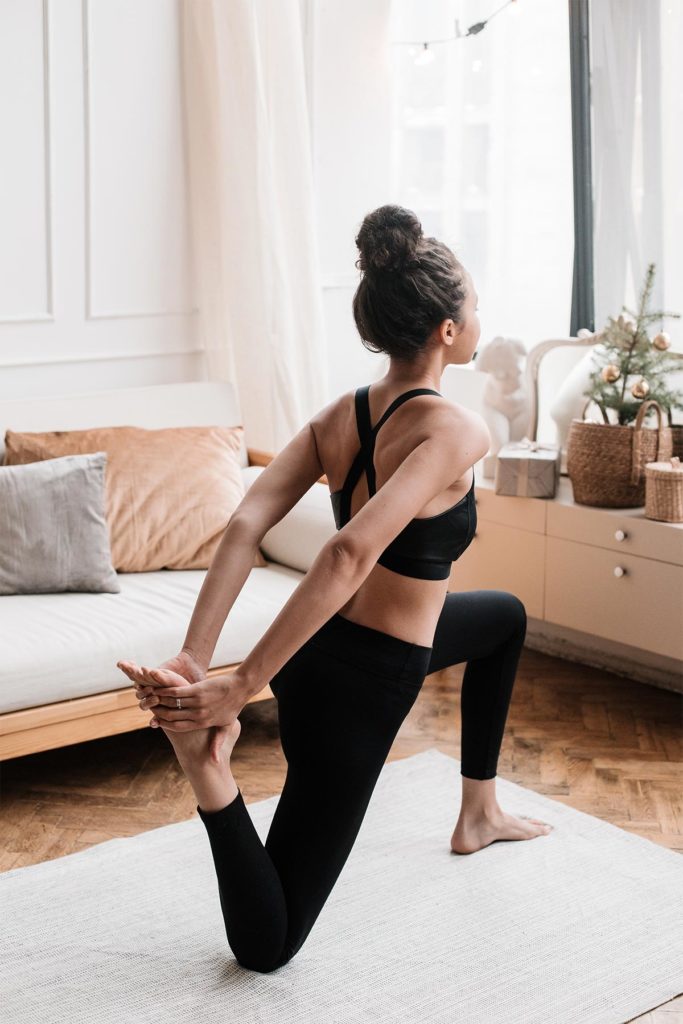
If health had a hierarchy, the health of your nervous system would be at the top. The nervous system is the pivotal connection between your mind, body, and soul, or at least the bridge in which energy flows. It is a secret superpower in healing. Here are five ways to use your nervous system to get healthy.
Nervous system regulation is a fancy way of packaging up a lot of annoying and sometimes painful symptoms. In my own life, it looked more like digestive issues that led to nighttime bloating, making others question if I was four months pregnant. When really, it was just the bloating.
It also came out in an overreaction to harsh lighting (a.k.a. sunlight), an intense sense of smell that led to dull yet constant headaches, and a systemic inflammatory reaction that made me feel like a walking zombie.
I tried to link symptoms to food sensitivities, poor sleep patterns caused by toddlers, and the dreaded hormone problems. But these are just surface issues that are easy to blame. In a way, it was tangible, quantifiable data that made sense of my issues without dealing with the root problem.
The real problem was my dysregulated nervous system. A system responsible for communicating bodily action, like how to digest food and what hormones to release. A system responsible for connecting your brain to your biology — your psychology to your physiology.
Your nervous system is in direct communication with your brain and biology, including your enzymes, neurotransmitters, hormones, and subsequently your cells based on what it’s experiencing in and around you.
Learning how to nourish your nervous system is a game-changer in your health. You can’t get healthy without it.
Inside this podcast, I interview Jessica Maguire, an expert in Nervous System Regulation. We discuss why your nervous system is important, how it’s creating your health and how to use your nervous system to get healthy.
5 Ways to Use Your Nervous System To Get Healthy
Your nervous system is the bridge connecting your life to your body and your body to your life. The basic function is communication designed to keep you on a path of life that keeps you alive.
The nervous system takes in information based on what is happening inside your mind, life, and the world around you. It uses that information to form a perspective that shifts the body into action. The two responses creating the action are that of survival or thriving.
Given the goal of the body is to keep you alive, those survival mechanisms are strong. Especially so if you’ve experienced any level of trauma in life. Making your health an outcome of the trained cycles of your nervous system.
The good news is you have every ability to create new loops. Just as meditation helps to change your brain wiring, learning to nourish your nervous system builds resiliency – allowing you to handle stress without being overcome by it.
Learning how to build resiliency in your nervous system regulation changes the whole of who you are including, your brain, hormones, and cells. Here are five ways to use your nervous system to get healthy.
1. Sit Up Straight
The nervous system is impacted by your posture thanks to baroreceptors in blood vessels that send messages to your brain. These signals determine the working state of the nervous system. It’s a back and forth communication with your posture influencing your brain cycles and your brain cycles influencing your posture.
It may seem crazy, but the way you sit at your desk or approach other people tells the body how to respond. The posture state you used to find me in was a hunched stance with arms folded across my chest and my hands balled in fists.
It was a posture that reflected something similar to RBF. Meanwhile, my nervous system captured information from this posture that signified I was closed off, anxious, frustrated, or even stressed – sending out that message to the cells in the body.
Your posture communicates how the body is feeling, which then responds to your biology. How you present your body, whether open or closed, signifies how your nervous system responds.
Try opening up by releasing your arms to the side of your body. Stand up straight, roll your shoulders back and remove the string pulling your shoulders to your ears. Shift your breath from your chest to your belly while releasing your tongue from the roof of your mouth. Open your palms and take a breath.
Do you feel that? That’s the healing power of good posture.
2. Take Deep Belly Breathes
How you breathe and how fast you breathe tells a lot about how your nervous system is responding. In a state of stress, your abdomen tightens, and those deep diaphragmatic breaths turn into quick, shallow chest breaths. This is the mechanism of your flight or fight response dedicated to speeding up life-saving functions.
While necessary, prolonged time spent in flight-or-fight mode creates a systemic stress response that makes it nearly impossible to heal. Not to mention, it changes the entire job of the body, shifting your hormones, enzymes, and neurotransmitters away from their ideal and healthy function to one of survival.
Shutting down your ability to reproduce, zapping your libido, decreasing your ability to digest food, let alone process it, and slowing the oxygen absorption rate, suffocating the cells. Survival is necessary, but we can’t stay there.
Learning the art of diaphragmatic breathing, which is nothing more than deep belly breathing, is vital in slowing down the fight-or-flight response and lessening its length of stay. Deep breaths act on the vagus nerve, the central line of communication that tells the body it’s okay to relax.
Your breathing says a lot to your body – make sure you send the right signals by practicing deep belly breathing throughout the day. Try it out for yourself by slowing breathing in through your nose for a count of five. Try holding that breath for two or three counts before you slowly exhale for a count of four. Repeat over and over throughout the day – especially before you sit down for meals.
3. Hug Someone
Physical touch is one of the most critical aspects of intimate human relationships. Healthy physical contact also happens to be one of the most important aspects of a healthy body. It is directly correlated with physical and mental well-being, stimulating the vagus nerve – calming down the nervous system.
A simple hug, cuddle, or holding hands can help you digest food better, boost your immune system, release a flood of healthy neurotransmitters that make you feel good, and open up your reproductive system.
It’s one of the quickest ways to relax the nervous system while simultaneously increasing the immune system to fight inflammation. During a study on the power of touch, a cold germ was injected into participants and found that those who got more hugs had a better immune response to the virus.
Humans are relational beings, don’t ignore the power of physical touch but make it a part of your daily life. Hug others, cuddle with your kids or your furry kids, get regular massages, invest in a weighted blanket, or give yourself a massage. It could be the extra boost your body needs to relax and heal.
4. Work With Your Gut Bacteria
Over three-fourths of your vagus nerve, the link determining how stressed or relaxed you are is inside your GI tract. In a way, your microbiome has the power to influence the brain by hijacking vagus nerve stimulation changing the biological response.
An unhealthy microbiome is overstimulating the stress response while suppressing the vagus nerve – keeping your body in a state of fight or flight. But a healthy microbiome communicates otherwise, making it critical to healthify your gut.
Unfortunately, there is a lot of bad advice on healthifying your GI tract. It’s not nearly as difficult as we make it, and it doesn’t take any fancy supplement. Of course, there is a place for high-quality probiotic supplements (I recommend this one). Taking too many or the wrong kind is doing more harm than good.
When and how you consume food helps your GI tract more than anything else, even more than the food you eat.
The ideal situation for your GI system is you eat with your circadian clock. That means eating the majority of your food when the sun is on its way up to the highest point and eating less as it sets. It’s called circadian intermittent fasting (and much different than traditional intermittent fasting).
How you eat refers to the mindset space and environment in which you choose to eat food, whether relaxed or stressed. Your body cannot properly digest food in a stressed state, leading to poorly digested food making its way into the small intestine, damaging and killing good gut bacteria. The best-case scenario is you sit down in a safe space to enjoy your food—no work, no device, no stress while also sitting down.
Try it out for yourself. You’ll probably find you eat far less than you usually would.
5. Heal Your Pelvic Floor
The pelvic floor carries a unique benefit to the nervous system as it’s the house of grounding or balance inside the female body (the chest is for the man). It also tends to be a place where we hold our emotions, creating congestion and blockages in the way things move, including those nervous system responses.
Pelvic floor dysfunction prevents in several different ways, whether overactive or weak. Both lead to a change in muscle function, and over time, the fascia responds by creating a scar-like tissue working to ‘support’ the structural change of the pelvis. Unfortunately, this also leads to new or different pathways of the nervous system that cause more stress and congestion, creating more fire inside the body and reducing the vagus nerve activation.
Opening up and strengthening your pelvic floor can create a healthy flow of blood and nutrients through that region, including better communication through the nervous system.
Work to release the pelvic floor through a series of helpful stretches that allow you to relax the area while simultaneously practicing diaphragmatic breaths. The happy baby pose is a good place to start.
Lay on the floor with your knees bent. Bring your knees toward your belly at a 90-degree angle, with the soles of your feet facing up. Grab and hold the outside or inside of your feet. Open your knees until they’re slightly wider than your torso, and bring your feet up toward your armpits. Flex your hells and push your feet into your hands. Stay in this position for several breaths or gently rock from side to side.
you don’t have to be controlled by your body
What’s fascinating about this information is that it shows you don’t have to be controlled by your body and mind. You have the choice and the power to tell your body what to do. But you have to work with your body and mind instead of fighting against it.
By stimulating the vagus nerve, you tell your body it’s okay to relax and de-stress, leading to long-term improvements in your mood and well-being.
These are worth the daily practice.
Small changes but with a lasting reward!
YOU MIGHT ALSO LIKE THESE!
Fix your posture in 10-Days with Jessica’s free mini class – Posture Reset For Regulation (I took it and it was super helpful). Learn more about regulating your nervous system through the links below!
Listen to the rest of the podcasts inside this series below:
